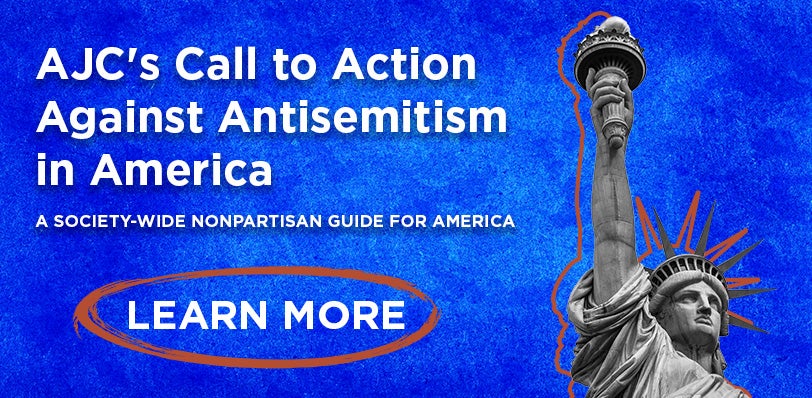Influencers, including those in popular culture such as athletes, gamers, and entertainers, have an increasingly invaluable role to play in the fight against antisemitism and hate. Many influencers count more followers on social media than there are Jewish people in the world.
AJC’s State of Antisemitism in America 2024 Report sought to better understand the level of celebrity influence when it comes to modeling opposition to antisemitism. About a third of American adults (17%) say they are very (4%) or somewhat likely (13%) to share with friends or family a post made by a celebrity or influencer that speaks out against antisemitism.
Influencers sharing accurate information online about Jews, Judaism, and Israel can be powerful, especially in the current climate: 67% of American Jews have seen or heard antisemitism online or on social media and 37% have avoided posting content online that would reveal their Jewish identity.
Influencers sharing accurate information online about Jews, Judaism, and Israel can be powerful, especially in the current climate: 62% of American Jews have experienced antisemitism online or on social media and 30% have avoided posting content online that would reveal their Jewish identity. Influencers– a term not limited to social media influencers, but anyone with the power or authority to sway or affect people’s opinions and actions– have the greatest potential to help change the reality for Jewish and all users.
Please note that the suggestions offered below are not exhaustive. There is always more that can be done.
Understanding Antisemitism
Know how to identify antisemitism, including contemporary terms and tropes | Antisemitism can be difficult to pinpoint because it is motivated by disparate ideologies. Antisemitism can take many forms, not just swastikas sprayed outside a synagogue, or graves desecrated at a Jewish cemetery, for example. Holocaust denial and distortion are an expression of antisemitism as well as the trivialization of the Holocaust.1 Casual references to Hitler and the Nazis, while not necessarily antisemitic, are almost always perceived by Jews as insensitive and inappropriate. Conspiracies of Jewish power and control continue to threaten the well-being of Jewish communities. AJC’s Translate Hate is a visual glossary which exposes antisemitic tropes, words, and symbols that often hide in plain sight. In print or online, Translate Hate can be used to explain why something is antisemitic.
Recognize the difference between criticism of Israel and antisemitism | As antisemitism threatens the well-being of the Jewish community with renewed vigor after the horrific attacks on October 7, 2023 – and the subsequent war between Hamas and Israel – it is important to know how antisemitism can be cloaked under the guise of criticism of Israel. Numerous examples demonstrate how anti-Israel statements and actions can become antisemitic, with potentially perilous repercussions. Some ideas or statements can be perceived as threatening to the Jewish community. For example:
- “From the River to the Sea” is a catch-all phrase that symbolizes Palestinian control over the entirety of Israel’s borders, from the Jordan River to the Mediterranean Sea. This saying is often interpreted as a call for the elimination of the State of Israel.
- “Globalize the Intifada” is a phrase used by pro-Palestinian activists that calls for aggressive resistance against Israel and those who support Israel. The most prominent expressions of intifada have been through violent terrorism, so this phrase is often understood by those saying and hearing it as encouraging indiscriminate violence against Israelis, Jews, and institutions supporting Israel.
- Similarly, “Zionism is Racism” implies that self-determination is a right for all people, except Jews. There is nothing inherent to Zionism that contradicts support for Palestinian self-determination. According to AJC’s State of Antisemitism in America 2024 Report, 81% of Jews say caring about Israel is an important part of how they think about their Jewish identities. Therefore, calling all Zionists racists or saying Zionists deserve to die is dangerous not only to Israelis but towards the vast majority of American Jews.
- Using data from problematic sources, such as the Gaza Ministry of Health, which is run by the terrorist organization Hamas. When the media relies on data and figures from Hamas and quotes them as fact, they can be spreading misinformation, or even psychological warfare, with dangerous ramifications. In general, it is critical for the media to be aware of how the majority in the Jewish community perceive tough questions about what is happening in Gaza.
- Finally, holding Israel to a different standard. Expecting Israel to refrain from defending itself against terror attacks, particularly those that occurred on October 7, 2023 – the most deadly attack against Jews since the Holocaust – is a double standard that would not be expected of any other democratic country.
Listen to Jewish influencers | There are many Jewish influencers, from a wide variety of backgrounds, religious expressions, and places across the world, on various social media platforms. To understand the antisemitism they face online, outreach and support is critical. Sending a direct message or DM goes a long way.
Help others understand antisemitism | Because the first step to stopping antisemitism is to understand it, influencers can share critical, albeit digestible information with their followers. 30% of Americans are not familiar with the term antisemitism and influencers can help lower this percentage. Share AJC’s short, animated film called “What is antisemitism?” to understand what antisemitism is and how it has changed over time. Share also “Who are Jews?” to help Americans and all English-speakers better understand Jewish history and identity.
Responding to Antisemitism
Issue condemnations | AJC’s State of Antisemitism in America 2024 Report found that 90% of Americans believe antisemitism affects society as a whole, and yet, in many instances, Jews feel as though hatred of them is ignored, discounted, or not taken as seriously as other forms of hate and bigotry. Condemnations of incidents are important, but so are messages of solidarity to let Jews know that they are not alone.
This action is especially needed because according to AJC’s 2023 Report 35% of Americans reported they would share posts by celebrities or influencers speaking out against antisemitism with their friends or family. And, according to AJC’s State of Antisemitism in America 2024 Report, almost one in five (17%) Americans are likely to (either very or somewhat) reshare posts of celebrities, athletes, or influencers speaking out against antisemitism on their own social media channels. Unfortunately, it has become all too common to issue universal condemnations of hate that fail to mention the anti-Jewish character of the incident, or list antisemitism among a list of hateful “isms” when it was just the Jewish community targeted. Strong statements of condemnation should come immediately and should:
- Specifically name and condemn antisemitism when it occurs, even in the larger context of free speech.
- Offer pathways forward, including resources for victims, that can help the community heal while also proactively addressing antisemitism by generating an improved understanding of Jewish history, identity, and heritage.
- Define antisemitism. Dozens of cities and municipalities across the country—as well as corporations, sports leagues, and universities— have embraced the IHRA Working Definition, to help determine when incidents may be deemed antisemitism.
When influencers, including social media influencers, athletes, actors, artists, musicians, and other celebrities, hold each other accountable, it helps push antisemitic rhetoric to the fringes where it belongs.
Collaborate with Jewish influencers | Collaborate with Jewish influencers to share resources when antisemitism occurs. Amplify the voices of trusted, nuanced Jewish content providers and organizations, ensuring they represent the mainstream opinions of Jews. If you see that your Jewish influencer friend is facing antisemitism online, offer to collaborate on educational posts and content to help spread awareness and helpful information against antisemitism. You can also reach out to organizations like AJC to collaborate on posts and projects to help raise awareness against anti-Jewish hate.
Identify, report, and share the knowledge | Report antisemitic comments or DMs across platforms, and screenshot to document them. If found on Instagram, consider sharing the hateful comment to your story to identify it as antisemitism for your followers and ask for their support in reporting the comment. However, it is important to guard against visual displays of hate. Consider whether blurring hateful symbols and words can prevent the dissemination of hate, or whether sharing the images within an educational context can show the impact it has on the Jewish community. Context is critical. Antisemites often seek public attention, and no one wants to inadvertently feed that desire.
Utilize AJC’s Translate Hate glossary to determine if something is antisemitic and share the link with followers along with the hateful comment. Remind followers that hate towards Jews does not end with Jews, that hate against one group impacts all of society, and that we cannot sit by silently and allow society to normalize hatred. As an influencer, your following allows you to be an educator and role model, which should not be understated.
Preventing Antisemitism
Partner with AJC to plan trainings | The U.S. National Strategy to Counter Antisemitism called on Experts on antisemitism and communications to hold briefings for influencers and work with them individually to develop educational content, including content for social media. AJC has trained numerous elected officials, law enforcement, corporations, sports teams, higher education institutions, and nonprofits to help them recognize antisemitism, raise awareness, and address it using a variety of tools. To schedule a personal training, or a training for a group of peers, contact antisemitism@ajc.org.
Share accurate information | Unfortunately, it has become too common for celebrities and influencers to use their influential platforms to spread antisemitic conspiracy theories, deny or distort the Holocaust or the October 7th Hamas terrorist attacks against Israel, or elevate antisemitic voices and other dangerous points of view. Before sharing material, think about the impact on the Jewish community: “How will Jews in the United States and around the world perceive what I am sharing?” “Might my post give fodder to antisemites, including far-right white supremacists, who are also avowedly anti-Zionist?” “Is what I am sharing misinformation that could, even unintentionally, lead to Jewish people being harmed?” Asking these questions before sharing content is paramount.
Be alert to antisemitism within trusted spaces | Influencers should avoid collaborations or coalitions that exclude Jews, deny the right of Jews to self-determination in their ancestral homeland, or demonize the Jewish state. Anti-Israel statements and actions are not always, but can be a form of antisemitism, and partners should have a nuanced and balanced understanding of the State of Israel and the people who live there. Review your or your platform’s association with, and potential sponsorship or remuneration of, individuals and entities that advance antisemitism. This might include reconsideration of a brand association, halting patronage, or “unfollowing” an account.
Display and celebrate allyship | Share not only about antisemitism, but also about Jewish pride and culture, history and identity, such as messages of well wishes on Jewish holidays and Jewish American Heritage Month, which occurs in May. This can be done through producing movies, shows, programs and lyrics that accurately portray Jewish themes and the rich diversity of the Jewish community. Advertisements about antisemitism and intolerance can be displayed alongside these movies, shows, programs and lyrics. Encourage fellow actors, athletes, writers, producers, and peers, to perpetuate positive messaging about Jews, the Jewish community, and Israel. When we humanize others and can relate to them, it becomes far more difficult for hate to spread. Your ability to help others understand who Jews are may be a helpful tool in preventing antisemitism from becoming reality. By creating, sharing, and collaborating on diverse content, we can promote understanding rather than hatred of the unknown on social media.
A pledge of what leaders in the entertainment and music industry can do to combat antisemitism and support the implementation of actions can be found here.
Celebrate the positive | So much of online discourse around Jews can be hyper focused on antisemitism and the Israel-Gaza conflict. But there is so much more to being Jewish than antisemitism or political conflicts. Consider partnering with your Jewish influencer friends on content that highlights the fun and exciting parts of Judaism including (but not limited to) the Jewish holidays, traditions like giving charity, and the Jewish idea of Tikkun Olam, repairing the world.


